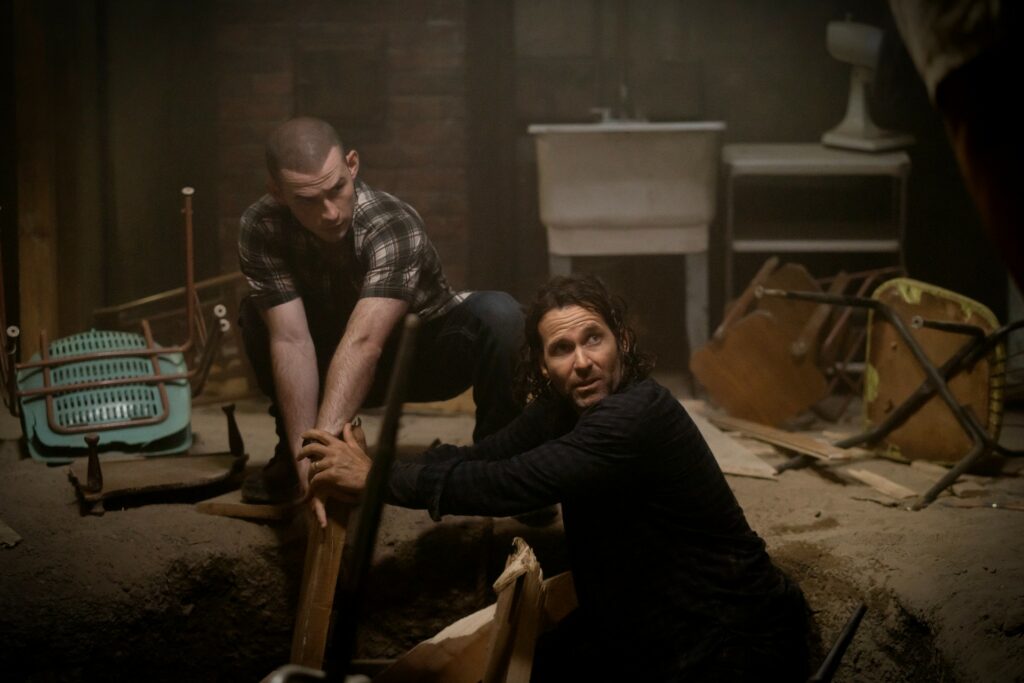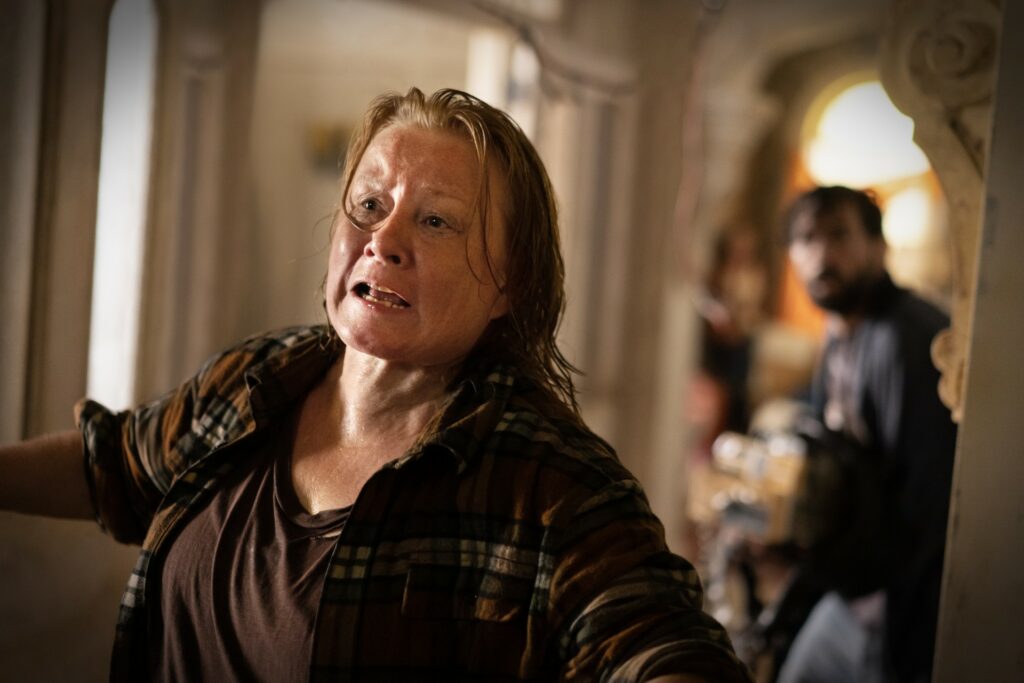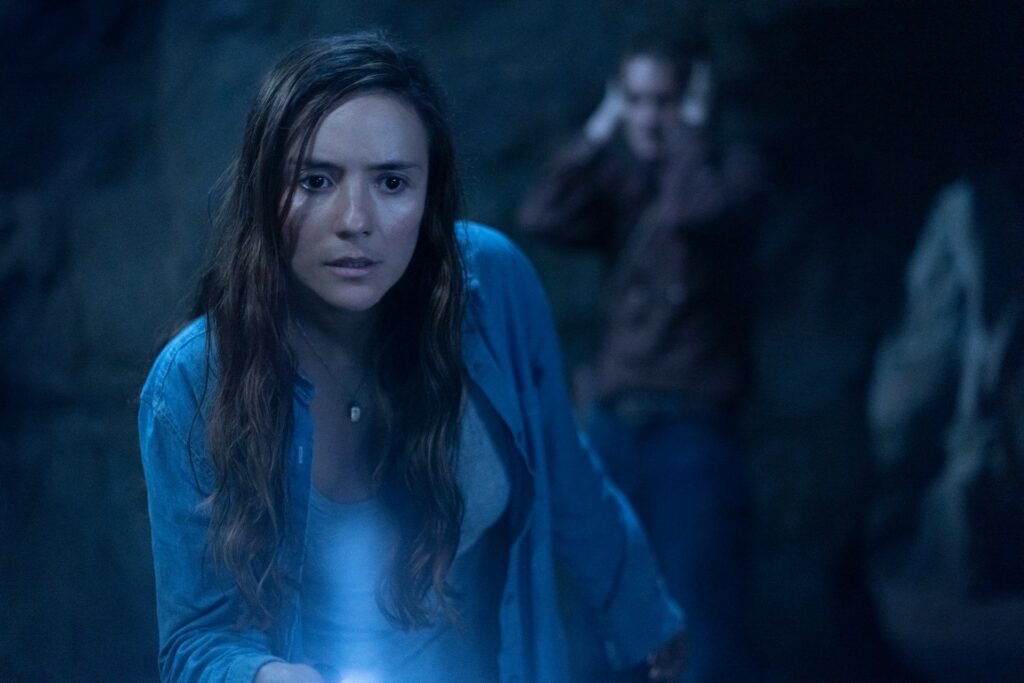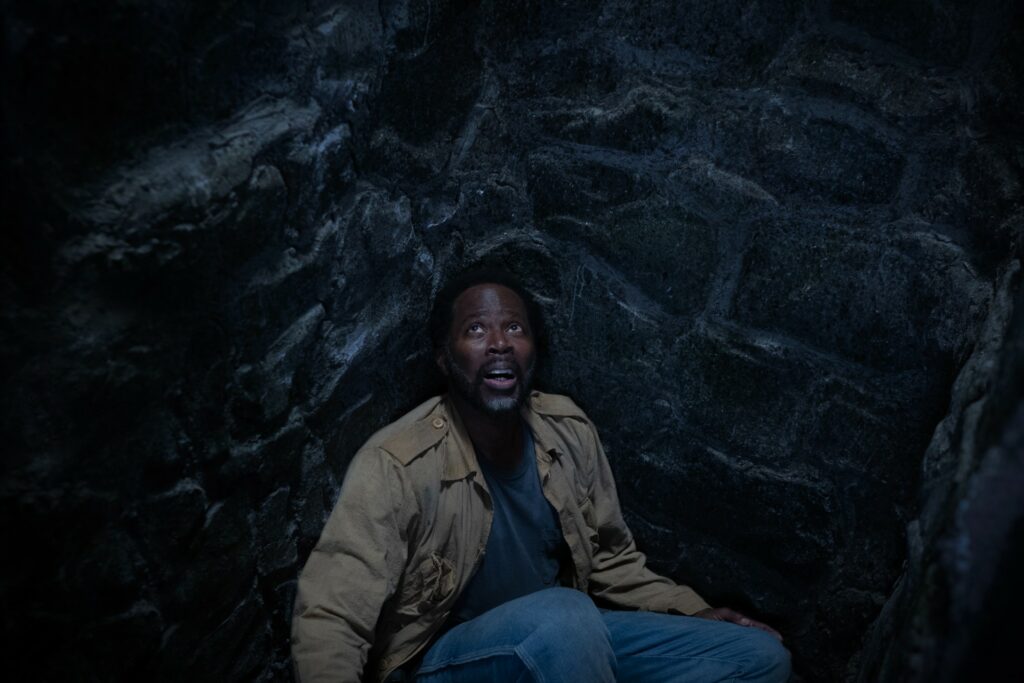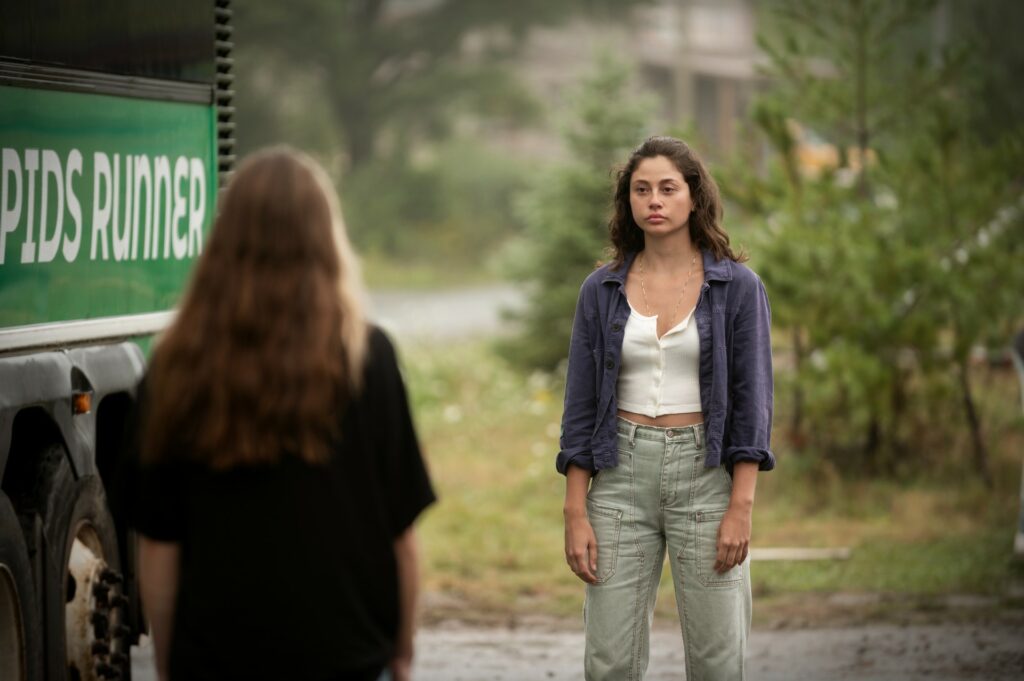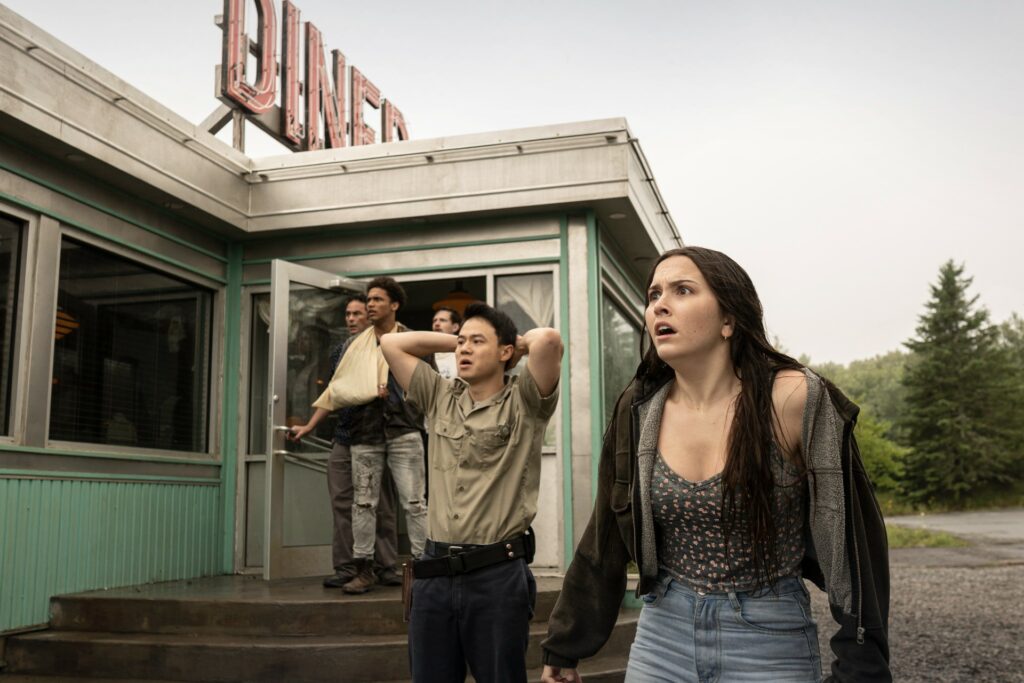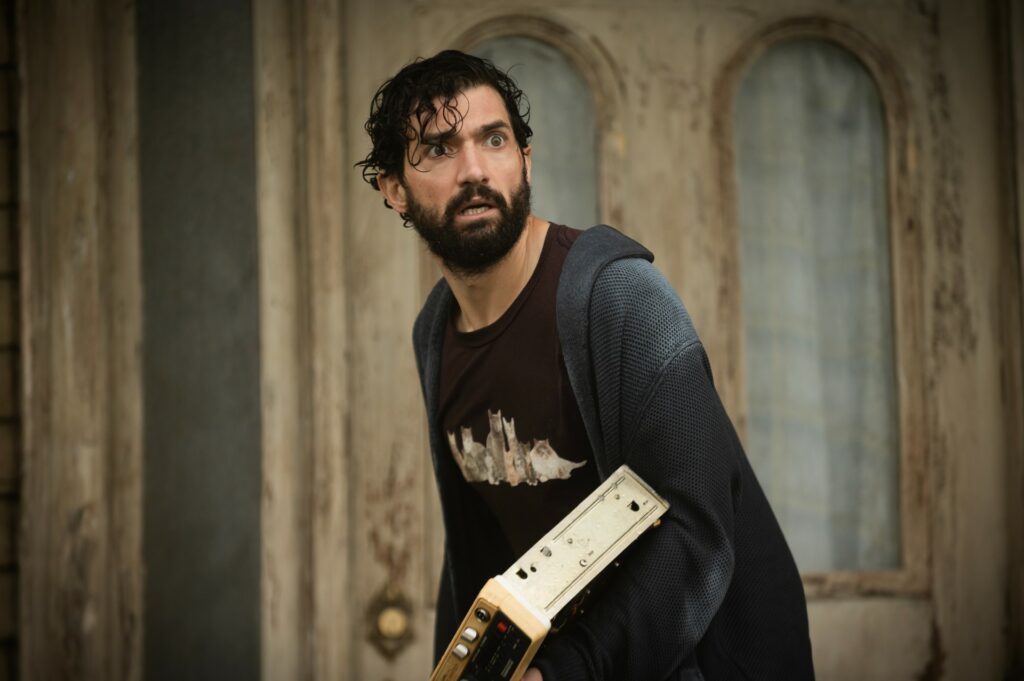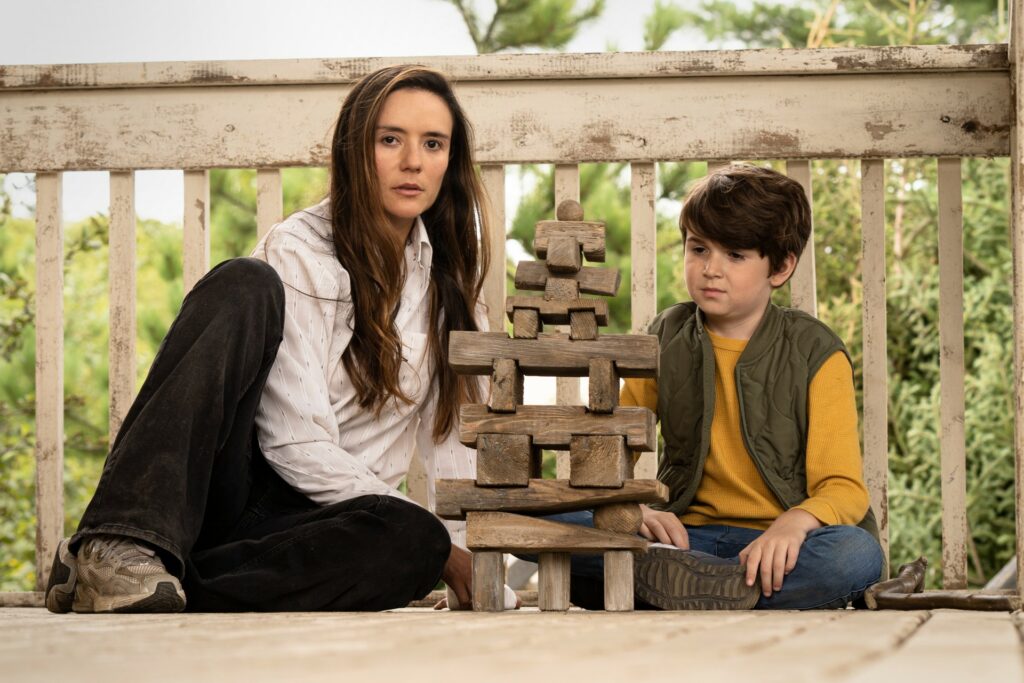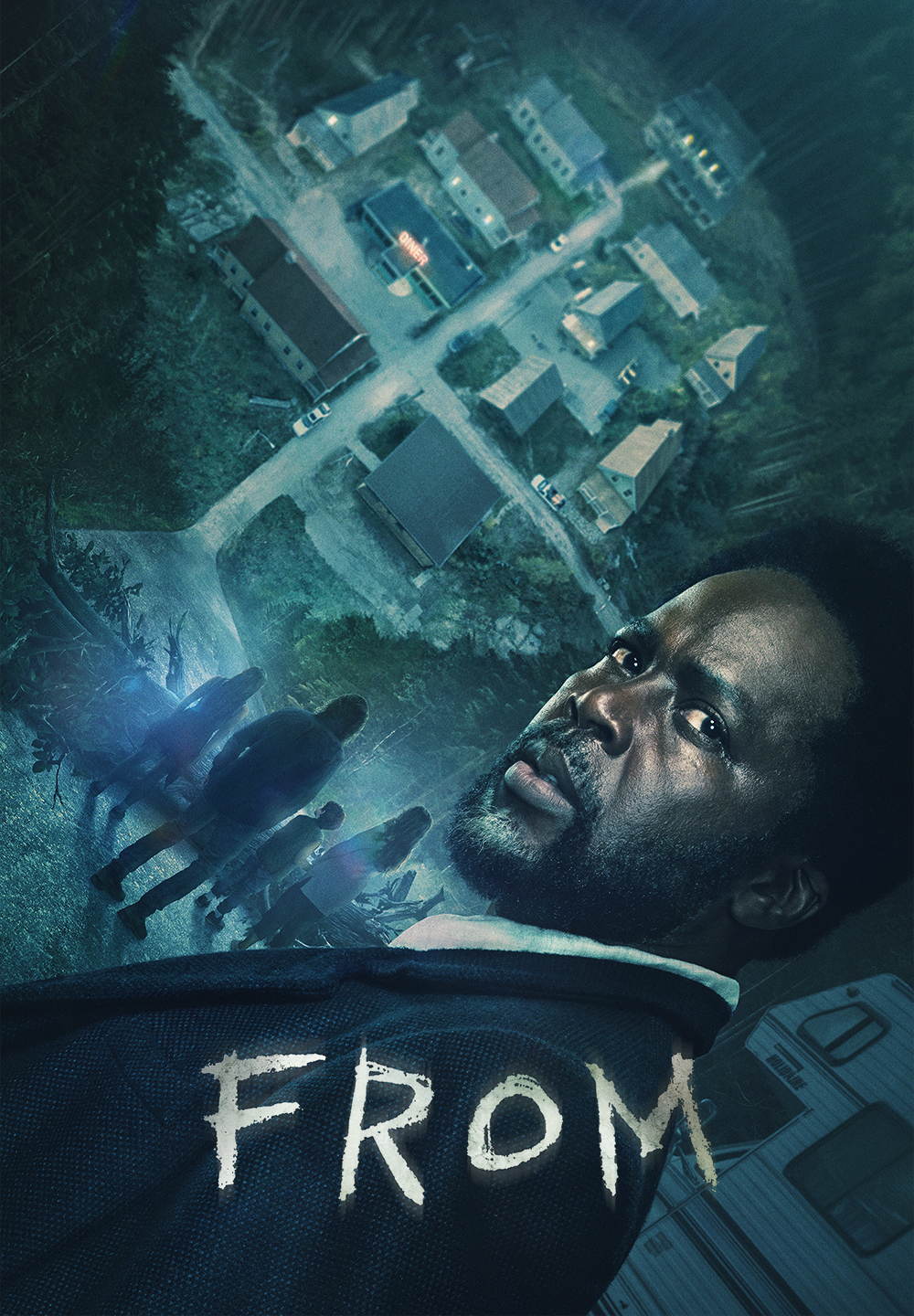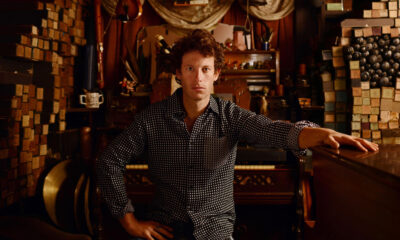Interviews
Harold Perrineau and Eion Bailey Discuss Their Characters on the Hit Show ‘FROM’
Harold Perrineau and Eion Bailey grab some interview time with V13 to chat about their characters on the hit show ‘FROM.’
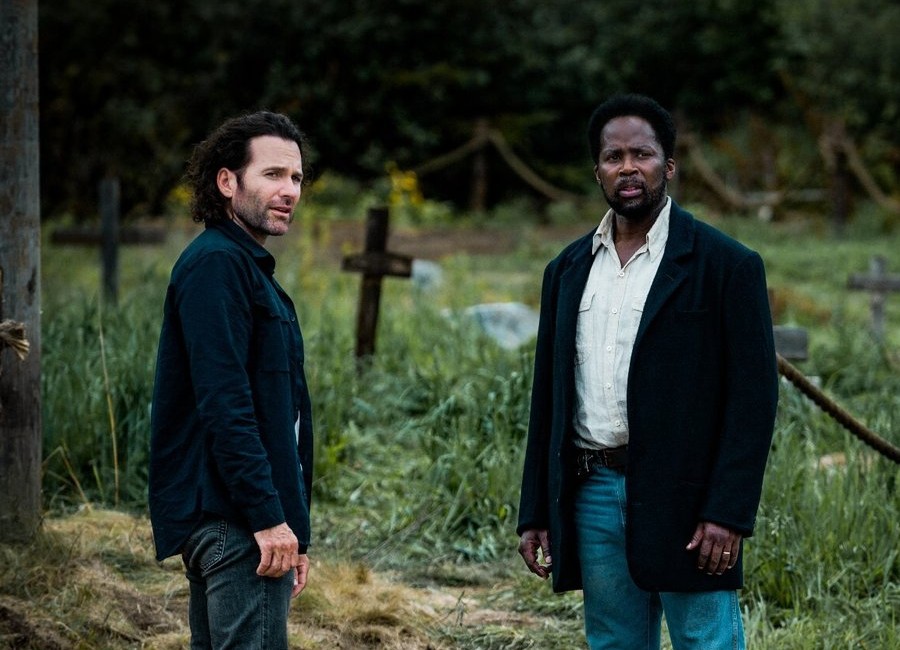
Shot in Halifax, Nova Scotia and near Beaver Bank and Sackville River, FROM Season Two is now streaming on Paramount+. FROM centers around a mysterious nightmarish town in Middle America that traps all those who enter. As the residents fight to keep a sense of normalcy while desperately searching for escape, they must also survive the surrounding forest and its nocturnal creatures. The series features a stellar ensemble cast, including Harold Perrineau (Lost)—with whom we previously spoke about the show—and Eion Bailey (Band Of Brothers).
Season one of FROM ended with multiple cliff-hanger plot points for many characters before closing on a bus-load of new people pulling up in front of the town’s diner. The series picks up exactly where it left off; some of the townspeople are spread out in places unknown, while the rest get to indoctrinate dozens of new arrivals to the ways of their sinister township. Things start to get crazy right away.
In addition to Perrineau and Bailey, the FROM cast includes Catalina Sandino Moreno (Maria Full of Grace, The Affair), Canadians Shaun Majumder, Ricky He (The Good Doctor), Hannah Cheramy, Simon Webster, Avery Konrad, Chloe Van Landschoot, David Alpay (Castle Rock), Elizabeth Saunders (Clarice), Elizabeth Moy, Corteon Moore (Utopia Falls), and Pegah Ghafoori.
Produced by Michael Mahoney and written by John Griffin, FROM should appeal to fans of LOST, Castle Rock, and the horror genre in general. The writing and acting on FROM are top-notch, and the gore in the series is visceral.
We thank Harold Perrineau and Eion Bailey for taking a piece of their mornings last week to field a few questions for V13. The audio is available via SoundCloud (Perrineau / Bailey) and video via YouTube (Perrineau) if you’d prefer to hear Perrineau and Bailey’s answers in real-time.
Your character, Boyd, made some decisions in season one that has changed your dynamic with all of the characters on the show. Did this shift the way that you approach your character?
Harold Perrineau: “The thing that shifted the way I approached the character is actually the writing; it’s actually John (Griffin, series creator). John wrote the character really steady in Season One, dealing with a lot of opposition, but feeling strong that he could actually deal with it and could find a way, even if it was difficult.
“In Season Two, the questions become really different, and they really shake Boyd up, so I did have to approach it differently just based on the writing. And the writing is amazing. I mean, just amazing. And so, Boyd is really off-kilter in Season Two, starting off by being down; he got pushed into a tree and showed up in a well!
“I mean, at that point, all bets are off. So it’s really like he’s really questioning what’s going on and if any of it’s even real, and so that’s where we have to start with Boyd not knowing anything this year.”
It was crazy. I’m glad he wasn’t claustrophobic.
“Well, he is a little (laughs), let me tell you.”
Do you read your scripts and wonder, “How is Boyd going to compartmentalize this now?” So much stuff gets thrown at you, certainly in Season One, you’ve got to wonder when the guy’s breaking point is going to hit.
“You know what? Season Two really is about that. It’s really about pushing him. Through the season, things just keep changing, and there’s no time to compartmentalize, actually this time. He does it a little bit in the beginning, but then information keeps shifting, and new people know different things, and there’s a bus-load of people. And so there really is no time to compartmentalize.
“There’s only time for action; for quick, swift action. He has to keep trying to do that all season, even though he’s not sure if it’s right or if he’s actually doing the right thing – if any of it’s actually even happening. And so it really puts him on the back foot the whole season, just trying to catch up.”
FROM features a very large cast on a set that doesn’t offer a lot of privacy. What kind of challenges or benefits does that bring to you as an actor?
“There aren’t a lot of challenges; I got to be honest. It really offers a lot of benefits. We have a great set. There is space there, but we’re always all together, but that’s what the townspeople are; they’re always all together. Even when they have the town and the colony house, even though they had different ideas, they’re all there together, and so it makes, for me, it gives me a real opportunity to practice this kind of like, ‘What do I do with all of these people around? Always watching, always there?’
“It allows me to bring that to Boyd, how he’s dealing with anything, the pressure of it. For me at work, the pressure is just trying to be a decent person, the pressure for Boyd is trying not to get anybody killed (laughs), but I can translate it, I can make it feel real enough that it looks like he really is concerned about it, and Boyd really is.”
What do you feel has been your standout moment on the show FROM so far?
“Oh wow. My standout moment; I don’t know if I can figure that out. Just being able to be, and it sounds corny, but being able to be part of this; that’s a standout for me. Just being in this group and this ensemble of actors and being able to work on this show. There are so many great moments that are written that, for me, I couldn’t tell you what my standout moment is. But I can tell you that there’s just a lot of moments.
“Like the show, it’s just great, I think. There are a ton of standout moments throughout, so I would have no idea what my standout moment is, none at all.”
Are there scenes you know of that have been filmed that haven’t made it into the final versions of the show? Do you think they’ll show up on the packaged media version of a Blu-ray or a 4K?
“You know what, I bet that they will. Pretty much everything we film winds up on screen, even if it doesn’t wind up there in the order that we originally read it. And that’s the genius of Jack Bender; he’ll see something go, ‘Oh, that doesn’t work there,’ and he’ll put it to the side, and another episode will come up, and he’ll go, ‘This is where it works.’
“And so I think if there are any scenes, I think for sure they will put it on something. They will undoubtedly put on blooper stuff because there are a lot of those! There’s a lot of wacky funny stuff that happens when you’re supposed to be scared, so crazy things come up all the time. So we’ll see about that.”
What advantages do you feel shooting the series on the East Coast of Canada brings to the series?
“Look, the biggest advantage is that we have one of the coolest crews ever, and they are there, and they are there to work and to be part of it, and they’re really a big part of what I think is a success on the show because we’re surrounded.
“But that being said, I am a city kid; I’m from the city, and small towns and little idyllic-looking towns are frightening to me. So for me, this is the perfect place, like I don’t know I’d ever live in Halifax because I’d be a little nervous everywhere. People are so nice, they’re really nice, but that’s how you know something’s happening in the background; they’re kidnapping people. So I don’t know what’s going on, but it’s not like Brooklyn!
“So for me, the setting is perfect and can be really, really creepy because at night, in those sort of rural areas, it’s dark. DARK, dark. Like in Brooklyn, there are street lights and people in their homes. It’s dark, dark. And the woods! Man, it’s scary. And so I think our town, the beautiful town in Halifax, is actually a great town to be really creepy.”
So when you read the initial scripts or your character, Jim, what attributes did you feel you wanted to bring to that character that maybe weren’t on the script pages?
Eion Bailey: “I feel deeply for my family and the need to look after and protect and guide and be there in service to my wife and my children, so I wanted to fully flesh that out and make that 100 percent believable that this guy would do anything that was necessary in order to heal the wounds of the loss in our family, the loss of a child and heal those wounds, because he definitely does not want the family to fracture, and I can bring that to the role.
“I also intimately understand the feeling of what it is to be trapped in a home and being told that everything is dangerous all around you and to stay apart and look at other human beings as possible vectors of disease or danger. I do want to tell the honest story of what that is and the cost that it brings psychologically to people individually and on a community level. So those are two things.
“And in that, those are both heavy things; I also try and bring a sense of humour to life, sometimes, I don’t succeed, but I always appreciate it if I can bring it forward and then when other people do as well. So to find that wherever possible, I’m looking for that as well, and if it’s not on the page, I look for places where I can bring it forward.”
As the only couple stuck in the town with younger children, you and Catalina play parents, trying to care for children in an environment that doesn’t offer a lot of safety. Does that wind up being something challenging to bring to the screen?
“It isn’t really challenging because she’s a really good actor, so when I’m playing with her, I’m working with someone who’s grounded and real, so there’s nothing taking me out, where I’m thinking, ‘That’s totally inauthentic’ or anything like that.
“And none of that happens with her. And our kids are real solid as well; the two actors, and then the attention to detail with the production and the directors; they’re in it, and everyone’s pretty serious about their craft, so it makes the suspension of disbelief totally possible. And not too much of a challenge.”
You and Donna are the only two characters who hear the voice at the end of Season One. What has that done to Jim in the episodes that are coming up in Season Two?
“It is the crux of a trajectory shift for Jim. In the first season, Jim is just trying to get his bearings and in protection mode, and then very quickly, how the hell do we get out of here as fast as possible? And because of the nature of what happens with that radio call, that starts him wondering, ‘Maybe this place isn’t what it seems? Are these monsters even real? Is this an experiment? Are there people on the other side of the curtain? Is this like the Stanford Prison Experiment? What is this? Maybe it’s something completely different than we think. Maybe we’re all under pharmacological products? Maybe we’re all drugged? Maybe we’re dreaming?’
“You’ve got to ask all these questions, so he starts to question the nature of people’s theories of this place, and then only once he understands what this place is can you make a realistic attempt to try and get out of it.”
In a show as relentless as FROM, your scenes with David, who plays Jade, are some of the most comedic on the show. Do you ever lose it while you’re talking to him? Do you burst out laughing during your scenes with him and have to reshoot it?
“I think we’ve had a few of those times, and as we were mentioning, the humour, you need it in terror and intense drama; you need at least gallows humour to let the breath come in. And the audience needs it too. So I’m always thankful for David; he brings up a lot of really fun, creative spontaneity, and I love playing off of it. And then I try and bring something myself, so I value that relationship and those scenes, and wherever you can get it, it’s probably a worthwhile thing.”
What can fans expect when Boyd and Sara return to the town? How is Jim going to react to them?
“Well, it’s another attempt at escape that doesn’t work, so it’s back to the drawing board. And at the same time, Jim is on his mission to figure things out, so it’s kind of the characters are going in different directions, working on different theories and trying different ideas and ways to figure this place out and to get out of here, and that’s one track that doesn’t work.
“And even the sheriff who seems to have been here in this town the longest, or certainly one of the people who’s been there the longest, doesn’t know either, and it just is more of a ballast for this thing of like; nobody knows. Nobody. Fucking. Knows.”
-

 Music5 days ago
Music5 days agoTake That (w/ Olly Murs) Kick Off Four-Night Leeds Stint with Hit-Laden Spectacular [Photos]
-

 Alternative/Rock7 days ago
Alternative/Rock7 days agoThe V13 Fix #010 w/ High on Fire, NOFX, My Dying Bride and more
-

 Alternative/Rock2 weeks ago
Alternative/Rock2 weeks agoA Rejuvenated Dream State are ‘Still Dreaming’ as They Bounce Into Manchester YES [Photos]
-

 Features5 days ago
Features5 days agoTour Diary: Gen & The Degenerates Party Their Way Across America
-

 Culture1 week ago
Culture1 week agoDan Carter & George Miller Chat Foodinati Live, Heavy Metal Charities and Pre-Gig Meals
-

 Music1 week ago
Music1 week agoReclusive Producer Stumbleine Premieres Beat-Driven New Single “Cinderhaze”
-

 Alternative/Rock1 week ago
Alternative/Rock1 week agoThree Lefts and a Right Premiere Their Guitar-Driven Single “Lovulator”
-
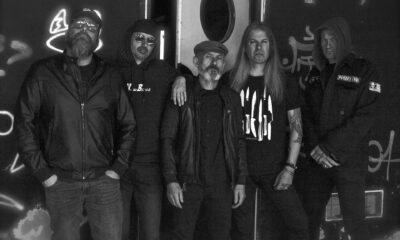
 Alternative/Rock1 week ago
Alternative/Rock1 week agoDeath Wishlist Are Fiery and Fierce with Their “I Get Bored” Video Premiere

